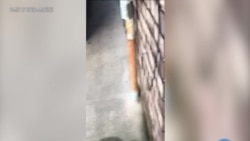It was the morning after Honduran national Marvin Rivera-Martinez was detained by U.S. Immigration and Customs Enforcement (ICE) officials in front of his wife and U.S.-born 7-month-old child.
Nervous and rattled, members of his family gathered in the living room around a wicker patio couch, with a community organizer who was on the phone with Saint Tammany Parish Jail, where Rivera-Martinez was temporarily being held.
Rachel Taber, an organizer with the Congress of Day Laborers at the New Orleans Workers’ Center for Racial Justice, relayed yet another round of unwelcome news. Visitation hours, Taber told Rivera-Martinez’s wife and her parents, were only on Tuesdays.
It was already Wednesday, and by the following week, Rivera-Martinez would be transferred to Pine Prairie, an ICE processing center about 300 kilometers (186 miles) away from their home in Chalmette, Louisiana.
Shielding her face, unsure of when she would be able to see her husband again, the detained immigrant’s wife, Shelsea, began to weep as her mother, Nolvia, clenched the infant’s stroller, staring into an empty corner.
“Lord, help us,” Nolvia said.
Nolvia attempted to reassure her distraught daughter as best she could. “He’s not alone,” she said. “There are other migrants there.”
Across the country, families of other undocumented immigrants targeted for deportation breathed easier that week in mid-July — if only temporarily — after large-scale immigration raids planned for 10 U.S. cities had mostly failed to materialize. In total, 35 people were detained out of about 2,100 targets, as a part of the ongoing Operation Border Resolve, acting ICE Director Matthew Albence said.
But for Rivera-Martinez’s wife and in-laws, the worst possible damage had been set in motion, or so they feared: an infant might grow up as a U.S. citizen without his dad. His young mother might have to raise him alone.
Retracing the moments leading up to Rivera-Martinez’s arrest on the morning of Tuesday, July 16, feelings of anger and confusion among the family turned to guilt and grief. Despite all the warnings preceding the raids — announced publicly by President Donald Trump — they wondered, how could this have happened?
Operation Border Resolve
Twenty-six hours after Rivera-Martinez was arrested in the family's three-bedroom, seven-person home, VOA spoke with members of his family. They agreed to open their home, recount their story and share their memories, on the condition that VOA would conceal their last names and faces, because of their mixed-family status and pending asylum claims. VOA reviewed the birth certificate of the couple's only child, who was born in New Orleans last December.
The family had fled what they claimed was targeted violence in San Pedro Sula, Honduras, in 2014, considered at the time to be the world’s murder capital.
U.S. officials overseeing the week's targeted operations remained focused on the big picture.
“We’re never going to have true border security unless we have a strong interior enforcement component,” Albence said during a July 23 media call regarding Operation Border Resolve.
“What we're trying to do is reduce that pull factor, restore some integrity to the system, restore integrity to the order that a judge issues, and try to reduce the flow that's coming into the border,” Albence added. He said 85% of individuals targeted had received final orders of removal in absentia — meaning they did not appear at their own court hearing.
Among all imigration cases, Department of Justice statistics for fiscal year 2017 — the most recent available — show an in absentia rate of 28% among all cases, a 2% increase from the previous fiscal year. Rivera-Martinez, a New Orleans construction worker who migrated to the U.S. from Morazán, Honduras, in 2014 as a minor, fell into that category.
According to Taber, the organizer, and the family, he had once gotten into a minor car accident and later missed a court hearing date. But Nolvia, the detained immigrant’s mother-in-law, insists the notice to appear in court never came in the mail.
When ICE eventually came knocking on her door, she claims the ICE officers fooled her into thinking they were local police officers who had “a few questions" unrelated to immigration status. Two days earlier, targeted enforcement actions had been suspended temporarily in the New Orleans area, because of the short-lived Hurricane Barry.
A reckoning
The family admits one misstep after another, including self-described “ignorance” of their rights in America regardless of legal status, and a slew of miscommunication in the moments leading up to Rivera-Martinez’s arrest. They also allege false representation and intimidation tactics by ICE, charges the agency would only partially discuss with VOA, but which Taber suggested are the norm.
“This family opened the door thinking that they were going to collaborate with law enforcement to help solve a crime, and in the end, their family was completely torn apart,” said Taber, whose immigrant rights group maintains a 24-hour hotline. “That means that [immigrant] families will be less willing to collaborate or report crimes when there are real emergencies.”
The "what ifs" have haunted Rivera-Martinez’s stepparents, who either failed to detect or failed to react in time to signs that an immigration enforcement operation was underway.
On the morning of the raid, ICE officers approached Mauricio, the stepfather, who was in his vehicle about to head to work. What if, instead of freezing with apprehension, Mauricio had called his wife and alerted the family that something was afoot, he wonders.
What if Nolvia — roused from slumber by loud knocks — had gazed longer through the peephole, scanning the agents' uniforms and possibly locating the word “ICE,” which she claims they had concealed with their bodies?
In response to written questions from VOA about the protocols in place for ICE officers approaching and entering a home, ICE Southern Region Communications Director Bryan Cox noted that its officers wear general police markings in addition to ICE markings “for the safety of ICE officers as well as the public."
“The word ‘police’ is the most universally recognizable symbol of law enforcement in most cultures, and many of the individuals who ICE officers encounter are not native English speakers,” Cox said. “Insufficient ‘police’ identifiers will increase the likelihood that a subject may resist, flee or take some other form of aggressive action against our officers.”
Shelsea described the details of the raid, from claiming that she was not allowed to dress while her husband was being taken into custody to fruitlessly trying to block the front doorway to keep ICE officers from taking him away.
“Move out of the way or I'll take your son,” Shelsea maintained one of the officers said to her.
Cox did not respond to specific questions from VOA regarding ICE’s alleged interactions with Rivera-Martinez’s wife.
As the scene escalated, Kritza, Shelsea’s 13-year-old sister, pulled out her cellphone and began to film the arrest. In the video, Shelsea can be heard sobbing and pleading with officers outside their home, while another officer appears confused that Nolvia is not in fact Rivera-Martinez’s mother, but his mother-in-law.
“He’ll be left without his papa, please!” Shelsea begs through tears.
Nolvia, who maintains her composure speaking before the officers, later told VOA that she feared ICE might retaliate for her younger daughter’s filming.
She takes a deep breath as she reckons with it. Unsure of what comes next, she defers to her God for direction.
“He’s the only one who can guide us,” she said.
An earlier version of this story has been amended to clarify that while defendants fail to appear in court in 28 percent of all immigration cases, 85 percent of those targeted in mid-July immigration raids had failed to appear for their final court date.














